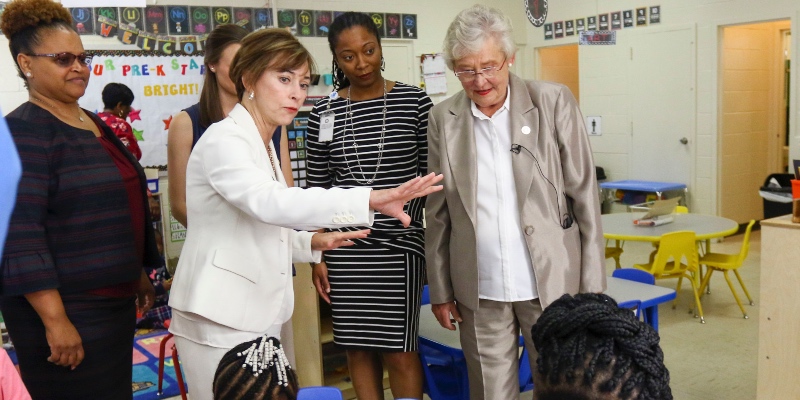An exciting new study has shown that students who participate in Alabama’s First Class Pre-K program are more likely to be proficient in math and reading. Researchers also found that their work indicated “no evidence of fade out of the benefits of First Class Pre-K over time.”
The study was released Wednesday to coincide with Department of Early Childhood Education Secretary Jeana Ross announcing that new pre-k classroom funding applications for the 2019-2020 school year are now open.
In a letter, Ross noted, “For the 12th consecutive year, Alabama First Class Pre-K is the highest quality, state-funded pre-kindergarten program in the country as recognized by the National Institute for Early Education Research quality benchmarks. There are currently 1,045 First Class Pre-K classrooms statewide serving almost 19,000 four-year-olds, reaching 32% of Alabama’s eligible four-year-old population.”
Diverse delivery programs in all 67 counties across the Yellowhammer State are encouraged to apply.
This includes childcare centers, public school systems, faith-based centers, college and university lab schools, private schools, community organizations, military childcare centers and other providers of preschool.
You can learn more about the new classroom funding application here.
The newly released study was conducted as part of the multi-disciplinary First Class Pre-K research evaluation team’s “ongoing, rigorous assessment of the program’s effectiveness.” This team includes faculty and staff from the University of Alabama (UAB) School of Public Health, UAB School of Education and the Public Affairs Research Council of Alabama.
The study concluded the following:
Students who received First Class Pre-K were statistically significantly more likely to be proficient in math and in reading compared to students who did not receive First Class Pre-K. These results persist after controlling for factors that have been shown to influence academic performance, including poverty, gender, race/ethnicity, classroom/school factors, and time. Further, effects are independent from within-school variation in the receipt of First-Class Pre-K, eliminating the potential for confounding from between-school differences in neighborhood socioeconomic status.
The analyses also indicate no evidence of fade out of the benefits of First Class Pre-K over time. These findings are especially meaningful considering that the observations are for students in 3rd-7th grades, representing persistence of the benefits of First Class Pre-K well beyond the end of the program and into later grades where some other programs have shown diminished academic impact.
You can read more about the study’s findings and methodology here.
A separate report released this fall named Alabama’s First Class Pre-K program as America’s best once again, lauding the state-funded program as the “only pre-kindergarten program in the country that comes close to having all the elements of a strong pre-k program.”
In its “Implementing 15 Essential Elements for High-Quality Pre-K: An Updated Scan of State Polices” report, the National Institute for Early Education Research (NIEER) found that Alabama’s First Class Pre-K program fully met 14 of the report’s 15 “essential elements” characterizing high-quality programs, and it partially met the 15th element, too.
Included among these benchmarks were measurements assessing a program’s leadership, early learning policies and program practices. Alabama’s performance in meeting the essential elements exceeded the national average by more than 233 percent.
Governor Kay Ivey has been a staunch supporter of the First Class Pre-K program, as part of her “Strong Start, Strong Finish” education initiative.
This past spring, the Alabama Legislature approved Ivey’s request for the program’s largest-ever single-year budget increase – an extra $18.5 million for First Class Pre-K in the 2019 program budget, bringing its annual total to $96 million.
“Having a strong start to one’s educational journey is critical to having a strong finish when it comes time to enter the workforce,” Ivey said in a release at the time. “Alabama’s voluntary First Class Pre-K program is, without question, the best in the nation. I am proud that we can increase the reach of this important educational opportunity, and I look forward to continuing to work with the Legislature to further expand the availability of voluntary Pre-K.”
In November, Ivey hosted a packed Early Childhood Education Leadership Forum, where the governor reaffirmed that she wanted to see continued progress moving forward in the early stage of education, including Pre-K.
Sean Ross is a staff writer for Yellowhammer News. You can follow him on Twitter @sean_yhn













